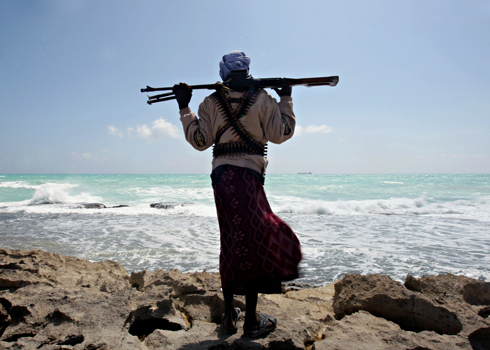When 14 Somali pirates boarded the yacht S/V Quest in February and took four Americans hostage, the feds say they were aided by a 15th man who used the Internet to research the hostages and their families.
Mohammad Saaili Shibin, also known as “Khalif Ahmed Shibin,” was indicted by a federal grand jury in Norfolk, Va., back on March 8, but the indictment remained under seal until he was captured and made an appearance in federal court Wednesday.
Officials wouldn’t go into much detail about how Shibin was apprehended. Neil MacBride, the top federal prosecutor in Virginia’s Eastern District, said that Shibin “was apprehended in Somalia through a joint effort led by the FBI and carried out in coordination with Somali authorities.” He called Shibin’s arrest “a significant breakthrough in the United States’ battle against Somali pirates” and said it marked the first time the U.S. government had captured and charged an alleged pirate in a leadership role.
“We hope that this indictment will strike at the heart of the piracy business and send a strong message to all pirates that they are not beyond the reach of the FBI, whether they board the ships or remain on-shore in Somalia,” MacBride said.
FBI spokesman J. Peter Donald told TPM that Shibin was arrested without incident on Monday, April 4 by “host nation security forces,” but couldn’t provide additional details.
The unsealed indictment alleges that the 50-year-old Shibin researched the identity of the hostages on the Internet to learn more about them and determine the amount of money to demand. He also allegedly tried to ascertain the identity of family members of the hostages who could be contacted about the ransom.
When the U.S. military tried to negotiate with the pirates who took over the Quest, one of the pirates directed them to Shibin, who acted as a negotiator. Though the military attempted to go forward with negotiations, all four of the hostages were shot and killed by the pirates, without provocation says the military, after one of the pirates fired a rocket-propelled grenade at a U.S. Navy ship.
Shibin “allegedly worked behind the scenes determining exactly how much cash could be extorted for the Americans’ safe release,” FBI Assistant Director in Charge Janice K. Fedarcyk said in a statement. “The FBI remains committed to eradicating this racket of extortion, kidnapping, and killing.”
Explaining the FBI’s authority to take Shibin into custody, MacBride said in a statement to TPM that the international community “has recognized for some time the need to take action against suspected pirates both at sea and on land.” MacBride said that pursuant to UN Security Council Resolutions 1846 and 1851, the U.S. “as one of the states cooperating in the fight against piracy and armed robbery at sea off the coast of Somalia, is authorized to take all necessary and appropriate measures in Somalia for the purpose of suppressing acts of piracy and armed robbery at sea.”
Shibin and the conspirators have been charged with piracy (which carries a mandatory penalty of life in prison) in addition to conspiracy to commit kidnapping and the use of a destructive device during a crime of violence. The investigation was conducted by both the New York and Norfolk field offices of the FBI.
[Ed. note: This story has been updated.]









